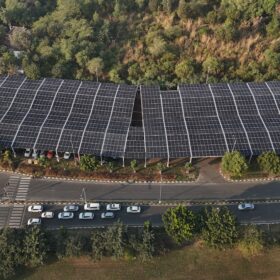The list of the leading solar states in India is due a shake-up this year, according to Norwegian analyst Rystad Energy, with Rajasthan set to usurp Karnataka as the PV capital and Andhra Pradesh expected to fall away thanks to policy uncertainty.
The annual review of the Indian market published by Rystad on Tuesday predicted Rajasthan will this year take advantage of the fact Karnataka has called a halt to solar tenders because it has already met its renewable energy purchase obligation for this year and next.
Solar development in Andhra Pradesh – India’s fourth biggest solar state, behind Tamil Nadu – ground to a halt last year after the election of Jaganmohan Reddy as chief minister at the end of May. Reddy swiftly set about attempting to reverse the clean energy policies of predecessor and political rival N Chandrababu Naidu and his threat to revise signed power purchase agreements in the state has spooked project developers.
Rystad predicts Gujarat, Telangana, Maharashtra and Uttar Pradesh will join the leading solar states this year, with the latter expecting to deploy more than 1 GW of new generation capacity in 2020.
Mature market
Oslo-based market intelligence firm Rystad said the manner in which India’s solar market withstood uncertainty over a safeguarding duty imposed on Chinese and Malaysian solar products, and land acquisition difficulties, illustrated a mature industry.
“Overall, 2019 proved that the Indian solar sector has matured,” stated the report. “The resilience that firms showed to bid competitively in the face of changing policies and regulations has kept the flow of investment intact and ensured that India has a robust pipeline of solar PV projects for the years ahead.” The competitive bidding referred to saw Indian developers keep the solar electricity tariff “well below” INR2.70/kWh in 2019, according to Rystad.
However, with fellow market research company IHS Markit having predicted India would add 14 GW of new solar this year, Rystad went even lower by announcing an expectation of 10 GW, and the same figure for 2021.
That assessment is based on 6.8 GW of new large scale solar capacity having been deployed nationwide by late December, a rise of 8% on 2018, with a further 1 GW of projects planned for last year having been pushed into 2020 on the back of uncertainty over how the safeguarding duty would be applied. The Ministry of New and Renewable Energy issued a clarification about the duty – which is due to fall from 20% to 15% next month – which appears to have reassured project developers. Of the 15 GW of solar capacity tendered nationwide last year, more than 7 GW was allocated in the first half, ensuring those projects should be commissioned this year.
Developers
Rystad is also predicting changes in the top project developer rankings, after seeing ACME Solar last year drop out of the list of the ten biggest companies by annual capacity deployed.
Adani Green Energy deployed 750 MW of new solar last year, most of it in Rajasthan plus a small proportion in Gujarat, and is expected to be active again in 2020. However, coal miner the Neyveli Lignite Company, the second biggest developer in 2019 with 744 MW rolled out, is expected to drop out of the top ten this year after completing most of the Tamil Nadu projects it started in 2017 and 2018. That would leave a gap for ReNew Power to fill, after developing 740 MW of new project capacity last year in Karnataka and Rajasthan.
The remainder of the top ten developer ranking last year was filled out by Azure Power, Tata Power Renewables, the Solairedirect Energy India subsidiary of French state-owned utility Engie, the Actis Energy operation of the London-based emerging markets energy investor, the Fortum Finnsurya subsidiary of Finnish state power company Fortum, Avaada Power subsidiary Giriraj and the state-owned Andhra Pradesh Power Generation Corp.
This content is protected by copyright and may not be reused. If you want to cooperate with us and would like to reuse some of our content, please contact: editors@pv-magazine.com.









India is always appealing when viewed from top on numbers. Marketing and research bodies, Business development executives of manufacturing units and investors from abroad will look at only numbers and base their ideas, projections on it as it gives a solid base.
Numbers matter but so is the process. The spurt in number of developers to promote Solar Projects is on account of the view from top but the rapidity with which organizations that work at ground level slow down their business, points to the none too healthy working environment. Ability of the developers to withstand the financial strain of Safeguard duty is a strong indicator of the industry but the low tariff rate that rings with it the cry and murmur of developers on shrinking margin and paucity of funds points to a future writ with gloom.
What matters finally is whether India can achieve the magic figure of 100 MW by 2022 not only on paper but physically on ground with modules operational, harness from sun as planned, reduction of dependence on fossil fuel generation and above all an all-time high carbon credit. The closeness of the final figure would be the correct base to talk about economy.